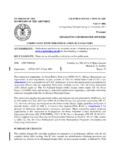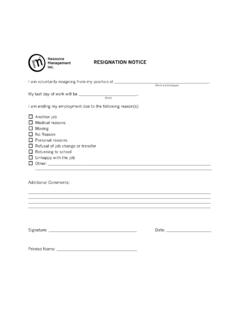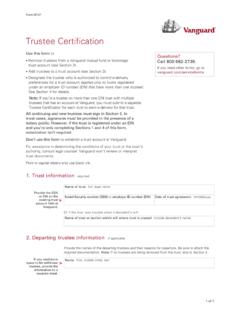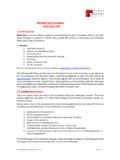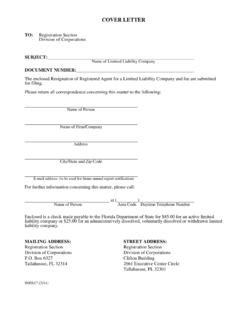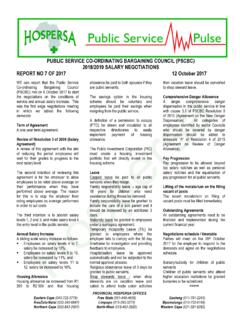Transcription of DisCussion PaPeR Resigning From a Board: …
1 DisCussion PaPeRResigning From a Board: Guidance for DirectorsaCknowleDGementsThis PaPeR was prepared by the ACCA Corporate Governance and Risk Management Committee, which exists to contribute to the improvement of knowledge and practice in corporate governance and risk management and to guide and shape ACCA s global strategies and policies in these areas. The Committee, chaired by Professor Andrew Chambers, comprises experts from business, the public sector, academia and ACCA Council. For more on ACCA s work in this area visit aBout aCCaACCA (the Association of Chartered Certified Accountants) is the global body for professional accountants. We aim to offer business-relevant, first-choice qualifications to people of application, ability and ambition around the world who seek a rewarding career in accountancy, finance and management.
2 We support our 122,000 members and 325,000 students throughout their careers, providing services through a network of 80 offices and centres. Our global infrastructure means that exams and support are delivered and reputation and influence developed at a local level, directly benefiting stakeholders wherever they are based, or plan to move to, in pursuit of new career opportunities. Our focus is on professional values, ethics and governance, and we deliver value-added services through our global accountancy partnerships, working closely with multinational and small entities to promote global standards and use our expertise and experience to work with governments, donor agencies and professional bodies to develop the global accountancy profession and to advance the public reputation is grounded in over 100 years of providing world-class accounting and finance qualifications.
3 We champion opportunity, diversity and integrity, and our long traditions are complemented by modern thinking, backed by a diverse, global membership. By promoting our global standards, and supporting our members wherever they work, we aim to meet the current and future needs of international business. The Association of Chartered Certified Accountants, December 2008 Resigning From a Board: Guidance for DirectorsCertified Accountants Educational Trust (London), 20082 One of the activities of ACCA s Corporate Governance and Risk Management Committee, since it was established in 2006, has been to formulate ACCA s corporate governance and risk management principles. These are to be found within ACCA s Corporate Governance and Risk Management Agenda1 Principle 2 is that boards should lead by example.
4 Boards should set the right tone and pay particular attention to ensuring the continuing ethical health of their organisations. Non-executive directors should regard one of their responsibilities as being guardians of the corporate conscience. Boards should ensure they have appropriate procedures for monitoring their organisation s ethical 5 is that boards should be balanced. Boards should include both outside non-executive and executive members in the governance of organisations. Outside members should challenge the executives but in a supportive way. No single individual should be able to dominate decision making. It follows that the board should work as a team, with outside members contributing to strategy rather than simply having a monitoring or policing role.
5 These and other principles now belong to ACCA s policy framework, to be used by the Committee, and ACCA more generally, in developing ACCA s specific policies on corporate governance and risk management for different sectors and regions; and in enabling ACCA to respond coherently to corporate governance and risk management issues as they guide on directors resignations is one of a series of monographs planned by the Committee to further the ACCA s corporate governance aims particularly in relation to aspects of the two Principles set out above and to provide practical guidance and make a contribution to the ACCA, Corporate Governance and Risk Management Agenda, (2008), available from Preface3 Resigning FRom a BoaRd.
6 Guidance FoR diRectoRs executive summary 5introduction 7due diligence when joining a board 8dialogue, the role of the chair and getting advice 10considering the risks 11 Records 12 Having the skills and time required 13considering resignation 14deciding objectively 15 Possible resignation issues 16making the resignation 17after resignation 18scenarios and dilemmas 21 Contents45 Resigning FRom a BoaRd: guidance FoR diRectoRs All directors will, at some time, leave the board. This guide is about when directors resign. As prevention is better than cure, this guide also suggests what a prospective director should consider before joining a board to spot potential issues which might later lead to resignation. The guide is written with UK listed companies mainly in mind but much of it is also relevant to directors of other types of organisation and in other parts of the world.
7 Due DiliGenCe on joininG the BoaRDIt makes sense to undertake general due diligence thoroughly and carefully before joining a board. Uncovering a potential resignation issue at this stage may enable it to be addressed in a non-contentious way. For example, a change to a problematic set of board procedures can more easily be changed before a problem becomes a board dispute. A prospective director should also form an appreciation of the financial statements, review management accounts, recent minutes of board and board committees and key supporting papers. An accountant joining the board may also want to speak to the audit engagement partner. The prospective director should understand why he or she is being invited to join the board.
8 Such due diligence should help to gauge the integrity of the board and of the senior management oF the ChaiRman anD GettinG aDviCeA director s resignation is also often linked to a failure of chairmanship. Good chairmen chair the whole board, not a particular group of directors on the board. Yet, at times, chairmen side with a faction of directors to the detriment of board cohesion. An effective chairman will ensure that all directors know that they can discuss concerns at any time in confidence with him or her and with certain others, including the company secretary. The company secretary could be viewed as the agent of the board rather than as a member of the executive team. Directors should have access to independent professional advice at the company s expense where they judge it necessary to discharge their responsibilities as directors.
9 A prospective director should establish discreetly whether provision for this financial support bodies such as ACCA offer an advisory service. While no substitute for specialist legal advice, such advisory services can be the RisksA resignation may be influenced by questions about the personal risk that may result from continuing on the board of a company that is in difficulty. An ex-director has no responsibility for the decisions of the board or for the actions of the company after his or her resignation, but the ex-director continues to have potential liability for what occurred before his or her resignation. In practice a Resigning director may well have accrued some culpability for the issue(s) that eventually led to resignation.
10 ReCoRDsThe records of board meetings can be important evidence, so a director considering resignation should be careful to check that board minutes accurately record the matter which may lead to his or her resignation. A director may be able to avoid or limit personal culpability by ensuring that his or her dissent is recorded within the board minutes. Ideally this should be done every time the subject has been discussed at the board. In practice it is quite likely that a director may fail to ask for his or her concerns to be minuted initially. As a result, the director may later feel obliged to stay on the board to play a part in extricating the company from the difficulties it finds itself in. havinG the skills anD time RequiReDMore is expected from a director with particular skills and experience than from one without those skills and experience.
